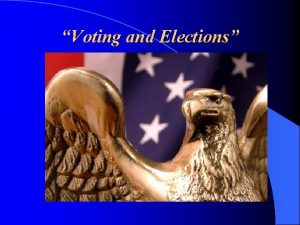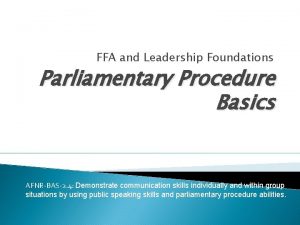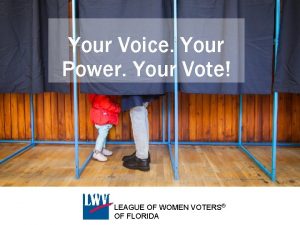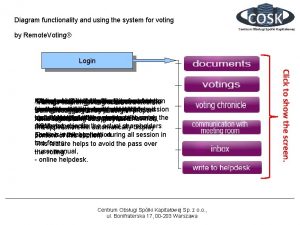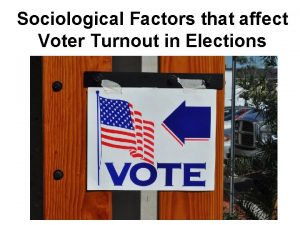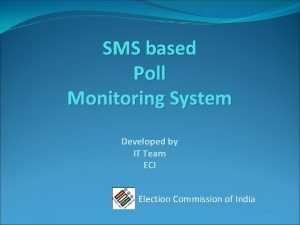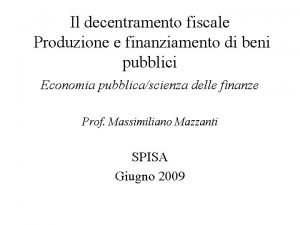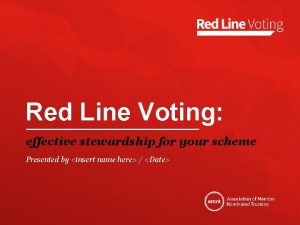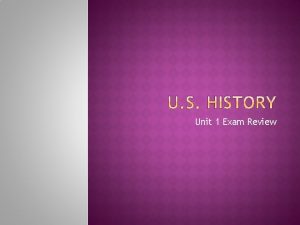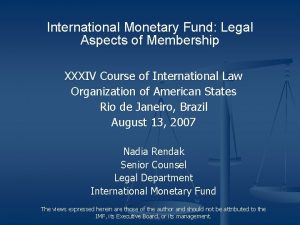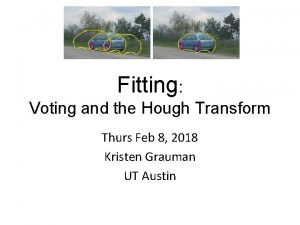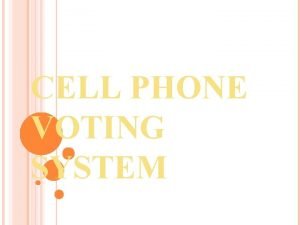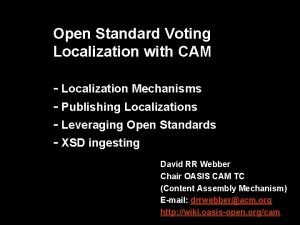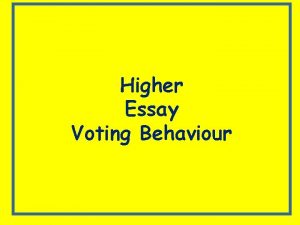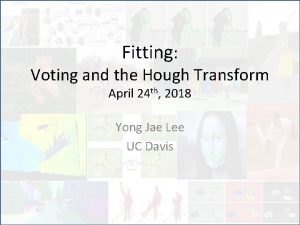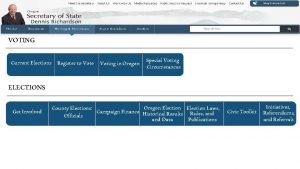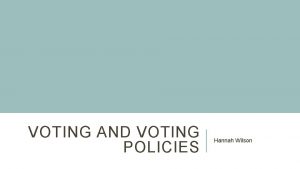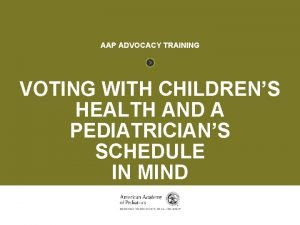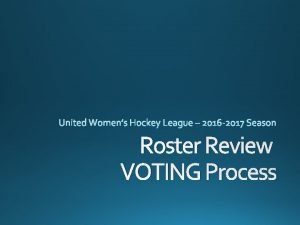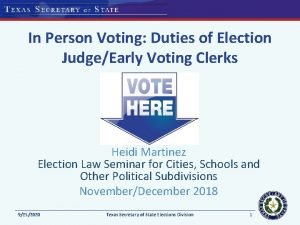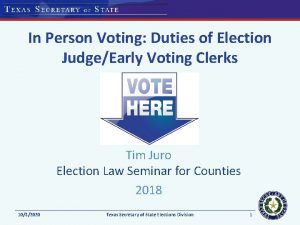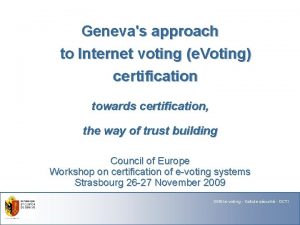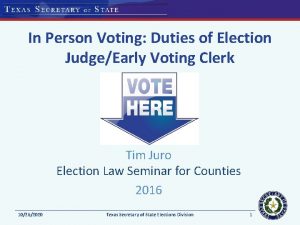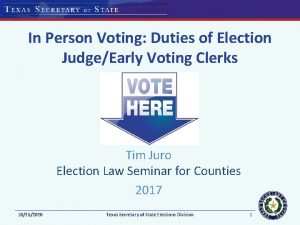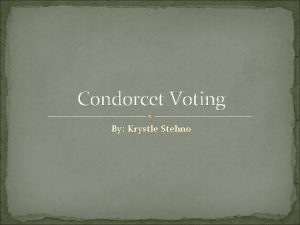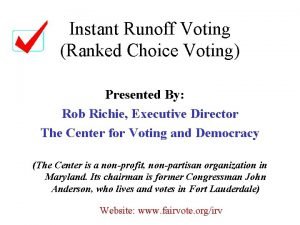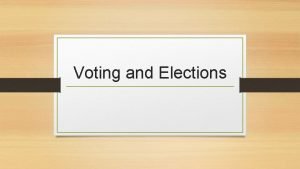Voting 10 1 10 3 History of Voting





















- Slides: 21

Voting 10. 1 -10. 3

History of Voting Rights: 1789 “Those who own the country ought to govern it” • • • Suffrage/Franchise – The Right to Vote Framers left the power to determine who has the right to vote to each State. At the time of the Constitution only people with right to vote were White Male Land Owners. • • 1 in 15 adult white males (6% of population) could vote in Today, 220 million Americans are eligible to vote

How the electorate grew over 200+ years… 1. 2. 3. 4. 5. Elimination of religious qualifications and property ownership & tax payments qualifications. 15 th Amendment - No citizen can be denied the right to vote due to race or color. 19 th Amendment - Women given the right to vote. Voting Rights Act of 1965 & S. C. Cases secure African Americans full voting rights 26 th Amendment - 18 years is minimum voting age.


Obstacles to African American Voters • • • Literacy tests Poll taxes “White Primaries” Gerrymandering Administration of registration laws

Literacy Tests

Poll taxes • Eligible voters were required to pay their poll tax before they could cast a ballot. • A “grandfather clause” excused some poor whites from payment if they had an ancestor who voted before the Civil War, but there were no exemptions for African Americans.

“White Primaries” • • • Exclusion of African-Americans from participation in primary elections to determine candidates for Party Southern Democrats did this to prevent any African American candidates getting on the ballot. Supreme Court eventually struck this down.

Racial Gerrymandering • • If African Americans are spread out throughout a state, they might not have sufficient numbers in any one district to elect any representatives at all. In the past, many US states have brought about this outcome deliberately, drawing their maps to ensure whites would win every district. The federal government addressed this in the Voting Rights Act of 1965, which made it illegal to draw districts that intentionally dilute the voting power of a protected minority. Judges assess how geographically logical the districts are, to make sure they aren’t unnaturally designed to disenfranchise minority voters.

Administration of Registration Laws • Support - Prevents people with false IDs from voting • Against - Laws make it harder for certain types of voters to vote (elderly, disabled, poor and minorities)

Preclearance • • 1965 Civil Rights Act made it so any new voting laws passed by states had to first be approved by the U. S. Justice Dept. to be sure they were not discriminatory. Chief Justice John Roberts ruled that preclearance could no longer be used because the current conditions of voting in the U. S. did not call for this drastic of a solution anymore.

3 Factors in Order to Vote… • • • 1. Citizenship - must be a U. S. citizen 2. Residence - must be a legal resident of the state 3. Age - 26 th Amendment says cannot deny anyone 18 or older the right to vote

Voting Rates: Young & Old • • Overall 56% Eligible Voters Voted Young Americans 37% in 2012. Older Americans over 60%. Who do the politicians listen to?

Voter Registration • • • Must provide name, age, place of birth, present address, length of residence Advantage: It prevents voter fraud Disadvantage: If too difficult, it prevents people from voting

What factors can legally prevent a person from voting in most states? • • • People in mental institutions Found to be mentally incompetent People convicted of serious crimes

Off-Year Elections = Lower Turnout • Non-Presidential Elections = Off -Year/Midterm Election

Ballot Fatigue • • Farther down the ballot an office is the fewer the number of votes cast for it. Voters exhaust their knowledge or patience the further down the ballot they go and stop voting.

Why do people not vote? • • • “Cannot-Voters” - people who want to vote but cannot due to being resident aliens, physically disabled, in prison, religious reason, discrimination, poverty, job Actual Nonvoters - Don’t believe vote will matter. Happy with government or disenchanted. No political efficacy or too busy to vote. Time-Zone Fallout - Results from East Coast make people in West feel their vote doesn’t matter.

Voter to Non-Voter Comparison Characteristics of a Voter Characteristics of a Nonvoter • High income • Low income • High levels of education • Low levels of education • Long-time residents • Short-term residents • Married • Unmarried • Women • Men • Urban • Rural • Skilled/professional • Unskilled

Sociological Factors – Historical Info Low Income High Income College Graduate High School Graduate DEMOCRAT REPUBLICAN Women Men Young Old Protestants Catholics Jews Frequent Church Goers DEMOCRAT DEMOCRAT REPUBLICAN REPUBLICAN City Voters Rural Voters South East Coast West Coast DEMOCRAT DEMOCRAT REPUBLICAN REPUBLICAN While a person’s part affiliation normally doesn’t change, two factors can get a person to vote against their African Americans party identification… Latinos The candidate and issues

Straight Ticket vs Split Ticket Voting • • • Straight-ticket - vote all one party (strong party affiliation) Split-ticket - vote for candidates from both parties in an election. Independent = No party affiliation
 Vevox polling
Vevox polling Brainpop voting
Brainpop voting What are the four common methods of voting in ffa
What are the four common methods of voting in ffa Voting rights
Voting rights Activity diagram for online voting system
Activity diagram for online voting system Sociological factors that affect voting behavior
Sociological factors that affect voting behavior Ieee ou analytics
Ieee ou analytics Sms based poll monitoring system
Sms based poll monitoring system Voting by feet tiebout
Voting by feet tiebout Red line voting
Red line voting Which statement best summarizes freedom of expression
Which statement best summarizes freedom of expression Deployment diagram for online voting system
Deployment diagram for online voting system Membership of imf
Membership of imf Ams voting system pros and cons
Ams voting system pros and cons Online voting system project proposal
Online voting system project proposal Hough voting
Hough voting Meetoo voting
Meetoo voting Block diagram of mobile phone
Block diagram of mobile phone Instant runoff voting excel template
Instant runoff voting excel template Voting behaviour essay
Voting behaviour essay Hough voting
Hough voting Voting districts definition ap human geography
Voting districts definition ap human geography

